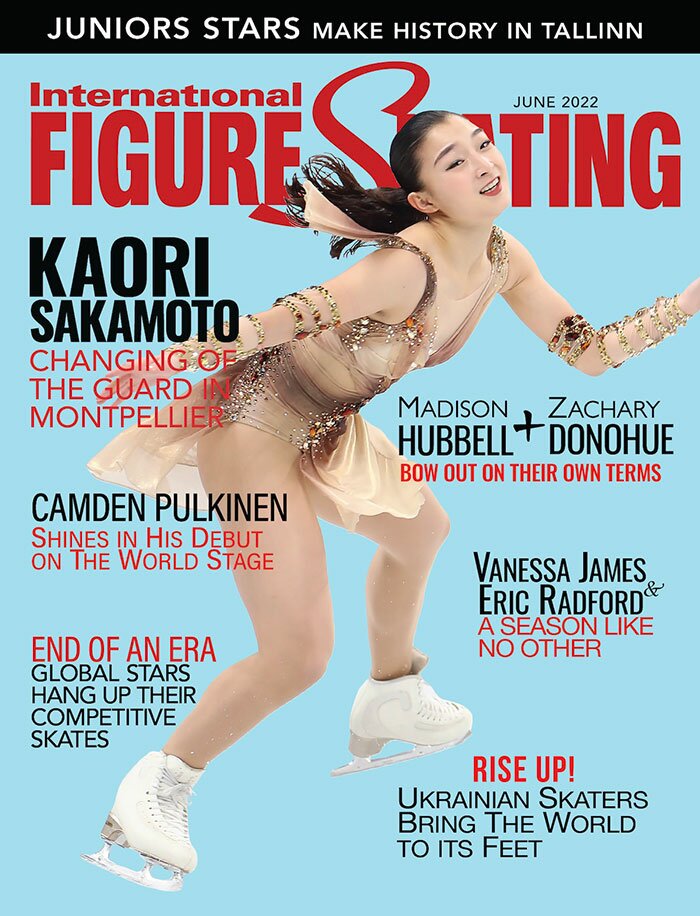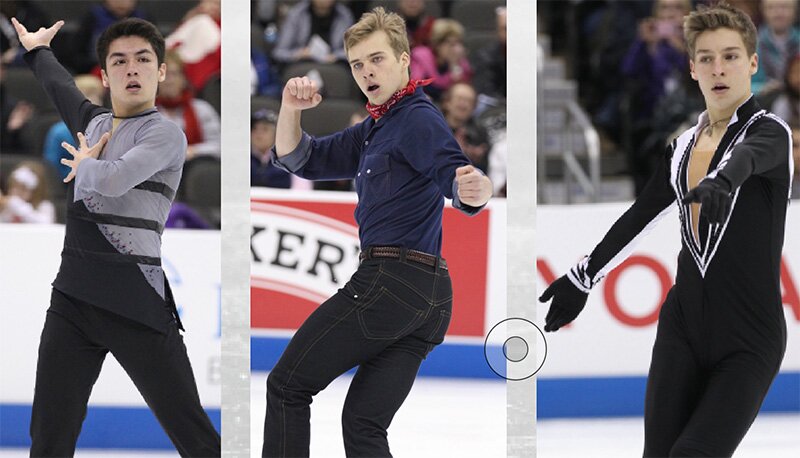
At the 2016 Junior Grand Prix Final there was one American man: Alexei Krasnozhon. This year there are three: Krasnozhon, Camden Pulkinen and Andrew Torgashev. I caught up with them to talk about their Grand Prix experiences and what they learned from those events; their goals for the Junior Grand Prix Final in Nagoya in December and the U.S. Championships in January.
ALEXEI KRASNOZHON – 17 – Ranks second heading into the Final
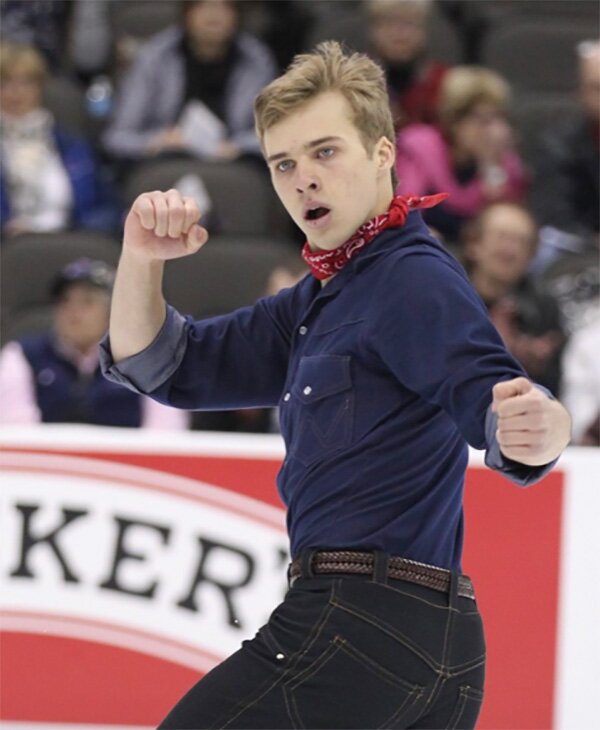 You won both Grand Prix events. What goals did you set in advance?
You won both Grand Prix events. What goals did you set in advance?
My goal from the beginning of the season has been to not only qualify for the Final, but to medal at the Final. I felt prepared going into both of my Grand Prix events and I knew that if I skated well I could win — so my goal at each of them was to win.
How would you rate your performances at the two events?
Considering that it was the start of the season, I think my performances at both my events were OK. There were a lot of things at both events that needed to improve. Going into the Final I have been really working to make those necessary improvements, and I hope that when I compete in Japan the programs will have a new look to them.
What aspects of your skating have you worked to improve this season?
I have worked the most to improve the quality of my edges, transitions and overall skating skills. I have been working on making my skating quieter with less toe scratches and my coaches, choreographers, and I have added more complex transitions into my programs.
In Croatia you achieved personal best short and combined scores, breaking the 80-point mark for the first time.
It felt great to finally break 80 points in the short program. A score of 80 points can be a fairly competitive score even on the senior circuit, so I was very happy to achieve that score without a quad in my short program.
In Croatia, you were competing for a berth at the Final. Did your experience in Slovenia last season help prepare you for this?
Last year, when I was in Slovenia, everything was new to me. I was very nervous and excited because I knew I had the opportunity to make it to the Final, but I also knew if I made too many mistakes I would not qualify. This season, I knew I was capable of not only making the Final, but also winning the event. So, in Croatia I was a bit nervous, but I just stayed focused on my goal, which was to win.
Goals and expectations for the Final?
To land a clean quad loop in my long program. I also want to compete two clean programs with all level four spins and steps. Those are the main things I would like to accomplish at the Final.
You are favored to win in Nagoya. What will it take to land on podium and who do you think your stiffest competition will be?
I think that even though I am the favorite to win, the Final is one of those competitions where all six men are capable of winning because you never know what is going to happen, who is going to make mistakes or who is going to rise to the challenge. I have an advantage because this is my second Final so I know what to expect, but the field is very strong. For me to win the Final I think that I will have to skate and perform like a senior man.
I think my biggest competition will be Alexey Erokhov; he is very good. We are very different in our skating styles, but it might be either he or I on top of the podium. It will just depend on who skates the cleanest programs.
What are your programs this season?
My short program, set to “Korobushka,” is something my choreographer, Scott Brown, and I created together. I really love how the music builds throughout the program and I love the character that Scott and I created. My long program is set to “Nelle tue mani” from “Gladiator.” I feel like the music is very inspirational. I watched the movie over and over to try and get a strong feeling for the music, but I do not think I was there at my Grand Prix events. However, I believe that I am finally getting a feel for the music and hopefully I will be able to show this at the Final.
This is the first time I am skating to a very strong piece of music and I think that I still need to grow into it. Creating the program was very difficult because we choreographed it to be a senior free skate and we wanted to make sure that all the transitions were different and that we fully utilized the music. It was a long process, but I am really happy with how the program turned out.
This will be your first season competing at the senior U.S. Championships. What you hope to achieve?
This year at nationals I would like to skate two clean programs and hopefully place in the top six.
Having made your senior international debut at the 2017 Philadelphia Summer International, what do you think the biggest difference is between the junior and senior levels?
The biggest difference between junior men and senior men is that juniors are very choppy in their skating — everything is a bit rough. A lot of people get confused sometimes as to why seniors can still score so much higher than juniors with falls or other mistakes in their programs, but with juniors everything is a bit unfinished. Juniors are like a piece of raw steak — they have the potential to be something great. Whereas seniors are like a nicely cooked piece of steak — the flavors are fully developed and ready to be enjoyed.
With senior skaters everything is finished and polished. They all have level four spins and steps with positive GOEs. Their transitions are intricate and they are able to maintain the character of the program throughout the performance. Their facial expressions are also very strong and they are able to make a connection with not only the judges, but with the audience. Junior skaters do not have the same ability to make that connection with the judges or audience. Senior skaters are able to draw the whole audience in.
Last year at the Final I saw Yuruzu Hanyu look up into the last row of the audience. Juniors make a connection with the judges, but only seniors are able to captivate the whole arena.
What are some of your goals for the second half of the season?
My goals really depend on which events I get selected to go to. If I am chosen for the World Junior team, I would like to add a second quad to my free skate and try to win the World Junior title. I would love to possibly be selected for the Four Continents or World Championships teams, but I do not know if this will happen. I haven’t put in too much thought into the Championship season yet because I am really trying to focus on the Final and nationals, of course.
Have you ever been to Japan before? What are you looking forward to seeing or doing in Nagoya outside of the competition?
I’ve never been in Japan, and I am very excited to go there! I would like to just go around the city and visit as many places as I can.
Most memorable moment from your Grand Prix experiences? When my coach, Darlene Cain, and I rode a ferris wheel in Brisbane, and I saw the city from the height of a bird.
CAMDEN PULKINEN – 17 – Ranks third heading into the Final
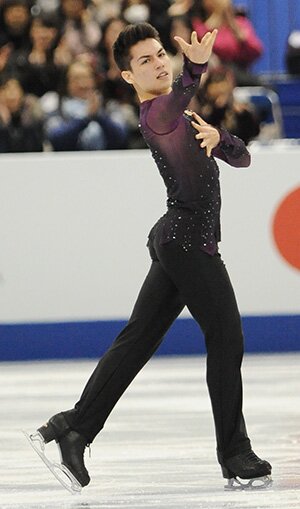 What goals did you set for the Grand Prix season?
What goals did you set for the Grand Prix season?
Qualifying for the Final was definitely my main goal from the start of the season. I was focused on improving my scores at both of my events and I was happy I accomplished that. Making the Final was an outcome goal, so I am happy I reached that. But, what I was really happy with was achieving scores that were over 200 points.
How would you rate your performances at both events?
I felt my performances were good in the sense that I showed a lot of improvement, both technically and in terms of components, but I also felt that I still have a lot of room to grow and improve, especially with my spins and my triple-triple combinations. We have made some changes to these things for the Final. Both competitions were good in the sense that I achieved my goals, but I am also happy that I was able to pinpoint the areas that I needed to work on, and I am excited to hopefully show some improvement at the Final.
You achieved personal best scores in Gdansk. What do you feel you could still improve?
In Gdansk, my scores were less of a shock to me. In Salzburg, I knew that I could score that high, but I never had before so I didn’t have complete faith that it would happen. After breaking 200 points in Salzburg, I had more confidence in Gdansk in my ability to put up bigger numbers, and I knew that if I skated well I could put up an even higher score than I did in Austria. So it was less of a shock when my scores were announced.
In Gdansk, you were competing for a place at the Final.
It definitely was nerve wracking. My coaches told me to forget about trying to make the Final and I really tried to, but I still had those expectations of myself and I was still thinking about it. This experience really taught me how to manage those expectations, which I did by breathing and getting back to my key words throughout the program. I think having that experience of being under that much pressure and having goals I wanted to achieve is really going to help prepare me for similar situations when I transition into the senior ranks.
What are your goals/expectations for the Final?
I want to demonstrate a very good triple-triple combination in both of my programs, achieve all level 4 spins in the free skate, and in my short program I would like to earn positive GOEs on my spins.
What do you think it will take to land on podium in Nagoya?
I think consistency will play a big role in what will happen at the Final. I feel like on the components side we are all pretty even and technically we are also all pretty even, so whoever brings it consistently in both programs will land on the podium.
What is your goal for the 2018 U.S. Championships?
I am staying in the junior ranks for nationals this year. My goal is to achieve a total score of more than 225 points, and to do that I will need to execute two clean programs.
Your goals for the rest of the season?
Hopefully, I will make the World Junior Championships team and get the chance to represent Team USA at such a big event. I hope that I am able to do that because it has been a big goal of mine this season, even more than qualifying for the Final. After nationals, I would like to add a quad or two into my programs. For Junior Worlds I would really like to add two quads to my free skate. I want to work on all the different quads in the off-season.
You made your senior international debut at the 2017 Philadelphia Summer International. What do you see as the biggest difference between junior and senior skaters?
In seniors, I feel like everyone has this aura around them where they are all there for a purpose with specific goals in mind, whereas, in junior, although there are a select few men who separate themselves from everyone else — and those are usually the ones on the podium, of course — I feel like the skaters are a bit sloppier and less mature. In Philadelphia, I was taken aback by the maturity and confidence of the senior men. I tried a bit too hard to fit in with the seniors and that is probably why I didn’t display two good programs. It was a good learning experience for me and it was really nice to be able to make my senior international debut at a lower risk event.
What are your programs this season?
My short this year is set to “Fix You” by Coldplay. My choreographer, Drew Meekins, and I were just messing around with different pieces of music on the ice one day and we came across “Fix You.” We both knew that the Shibutanis had used it and accomplished so many great things with the program. I knew that I would have some big shoes to fill and a lot of expectations for that program because Maia and Alex had skated to that music so well and with so much emotion.
Doing this program has really taught me how to pace myself and how to perform because I really look up to the Shibutanis and I really wanted to display a program at least somewhat close to what they were able to accomplish artistically. I had a lot of expectations of myself and I worked really hard in the off-season with modern dance and ballet to improve my components and my ability to interpret this piece.
For the long…last season I had a feeling that I wanted to skate to a very classical piece this season. Last year I felt like I made a lot of big strides technically but this season I really wanted to improve my components as I felt that I looked very unpolished last year. With the Chopin piece (12 Etudes, Op. 10-No.1 in C), I feel like the dance training I did this summer has really helped me with my skating skills, which in turn has also helped my jumps as it has taught me how to better control my body. Choosing this music has really helped improve all aspects of my skating because it forced me to take ballet.
Have you ever been to Japan before? What are you looking forward to seeing or doing in Nagoya outside of the competition?
No, I have never been to Japan before. I am stoked! I really want to go to some museums and explore downtown Nagoya.
What was your most memorable moment from the Grand Prix Series?
In Gdansk, there was a beach five minutes from our hotel. It was such a fun place to relax and take pictures.
ANDREW TORGASHEV – 16 – Ranks sixth heading into the Final
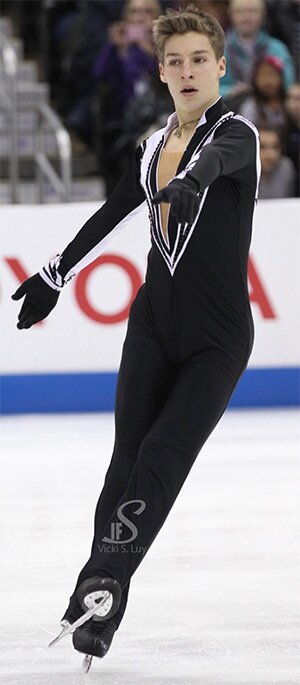 How did not qualifying for the free skate at the 2017 World Junior Championships help you prepare for this season?
How did not qualifying for the free skate at the 2017 World Junior Championships help you prepare for this season?
This experience definitely shaped my training for this season. I was battling injuries last season, especially right before and after nationals, but the experience taught me that sometimes I need to take a couple of steps back and re-examine everything. If I would not have learned the lessons I did from Junior Worlds and from my preparation for that event, then I do not think that I would have been able to prepare myself as well for this season.
Was qualifying for the Junior Grand Prix Final a goal this season?
It was one of my goals from the start of the season, but what I really wanted to do was to skate well at both events and be able to train the way I wanted for those events. I knew that if I was able to train, uninhibited by injuries, then I would be able to skate well at my events and hopefully qualify for the Final.
You achieved personal best scores in Belarus and placed fourth in Italy. How would you rate your performances?
I felt that my performances in Minsk were definitely better than in Egna. It was my first international and I was really eager to debut my new programs because I really like them. I was really happy when I finally got to compete them.
In Italy you were competing for a place at the Final.
In Italy I did feel a bit more pressure than in Minsk because I realized that I had a real shot at making the Final. I knew that I needed to just stay cool and skate well. In Egna, I was in a situation very similar to the one in Dresden last season. After placing second at my first event, I was in second in Dresden going into the free skate. Nerves got to me, I did not skate well and I did not qualify for the Final.
I was worried that this year I was going to be obsessed with making the Final and not focused enough on my job and what I needed to get done in the programs. So, when I was competing this fall, I was always trying to shift my focus away from the standings and more towards the elements that I needed to do and the program itself.
I wish I had skated better in Italy, but I did well enough to qualify so I guess I can’t be too disappointed.
What are your goals/expectations for the Final?
My goal is just to skate well. I have been training really hard and I will continue to train hard. I just want to go out and do what I know I can do. I want to set myself apart from not only the other skaters, but from my skating in the past. I want to show off all that I have in both my technical and artistic arsenal.
What do you think it will take to land on podium in Nagoya?
I think that everyone has a shot of making it onto the podium. We all just need to focus on our own elements and ourselves. We are all so close with our technical elements that, really, anyone could be on the podium. For me, I will be focusing on myself and trying to take the programs one element at a time.
This will be your second season competing at senior nationals. What do you hope to achieve this year?
Last year, nationals was a really big deal for me. In 2016, I missed nationals because of an injury and so the anticipation had been building for a while. Before 2017 nationals I was injured yet again, but I tried to mask it as much as I could and really push through. Really, nothing can compare to being on that big stage with all the lights on you, skating in an arena filled with people who are all so supportive. It was really a new experience for me and I am really excited to be back there soon. Actually it isn’t that long — only about seven weeks.
This year at nationals I want to skate two clean programs, which goes back to my goals for all my other events this season. I know if I stay focused and compete the way that I train then I will be able to skate cleanly.
What is the biggest difference between competing junior and senior?
When you are a senior skater your performance and your components need to be really on point. You have to be assertive in every detail of your skating. In juniors, there is a lot more leniency with this because you are not expected to be the absolute best yet. But in seniors you are already being compared to some of the skaters who are in the top ranks in the world. I also think in juniors there is a limit to what you can do in some respects, but in seniors that limit does not exist. Seniors is just a whole new ball game in terms of components.
What are your other goals for this season?
I think making the World Junior team is the most realistic goal, but I would love to also qualify for Four Continents and maybe even the World Championships. However, that would require me to have two fantastic performances at nationals.
In the past you have been plagued by injuries. Can you talk about your recovery process and how you dealt with those difficult times?
The injuries that I have had to deal with recently have all occurred mid-season and I made the decision to not take time off. This ended up hurting me in the end. I think you really have to be smart and listen to your body and the more you put off taking time off and healing your injuries the worse they get and the longer the recovery process is. It took a long time for me, after Junior Worlds, to recover and get back to feeling healthy. This is probably the first time in about two years that I feel totally healthy.
What are your programs this season?
My short program this season is set to “Moonlight Sonata.” With the program I am trying to show a different side of myself. It is less dramatic than what I usually skate to and much more classical. The footwork is one of my favorite parts. It is set to a very fast part of the music and it requires a lot of new techniques that I have learned with my skating skills. I am trying to not use long edges, but quicker, shorter ones. There is no time for me to make mistakes in the step sequence if I want to stay with the music.
For my free, I have wanted to skate to “Moulin Rouge” for a long time now — probably for the past three seasons. I chose this season because it is the Olympic year. My chances of making the Olympic team this year are very slim, but I still wanted to skate to it since I feel the music very well and I love performing to it.
Have you ever been to Japan before? What are you looking forward to seeing or doing in Nagoya outside of the competition?
No, I haven’t been to Japan, but I am really excited to go there. Aside from competing, I am really excited to finally try real, fresh sushi.
Most memorable moment from the Grand Prix season?
Just being able to have the opportunity to make new friends and spend time with them. The most important thing aside from competition is to have fun. When I am with new and old friends I am always happy and having fun.
RELATED CONTENT: 2017-18 GRAND PRIX FINAL SENIOR GRAND PRIX FINAL JUNIOR GRAND PRIX FINAL


